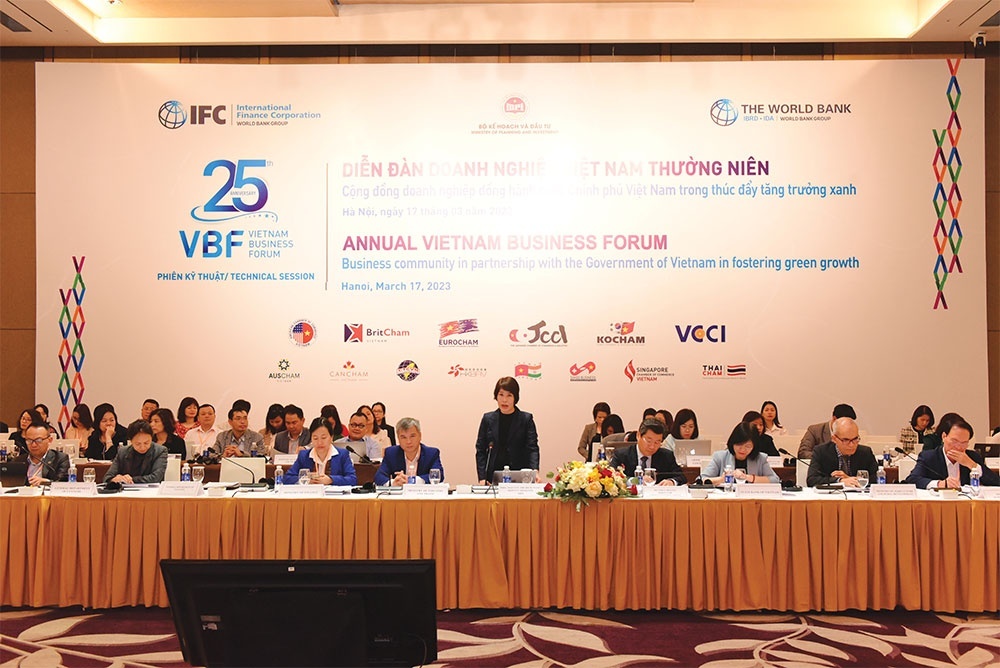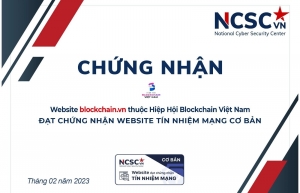High-tech talent pool to aid transformation
Proposals relating to cooperation and encouraging foreign investors to join Vietnam’s innovation journey were addressed at some forums, including one at VIR’s headquarters and the annual Vietnam Business Forum (VBF) organised in Hanoi over a week back.
 |
| Working groups of the Vietnam Business Forum touched on a variety of topics and recommendations for greater progress Photo: Dung Minh |
One particular area of discussion focused on the digital economy and tech such as blockchain.
Do Tien Thinh, deputy director of the Vietnam National Innovation Centre (NIC) said at VIR’s forum on digital transformation on March 21 that the NIC is working with many big foreign technology groups to connect them with domestic enterprises to implement training courses and technical supporting programmes.
Thinh said Google has implemented digital skill training courses for businesses, especially startups. In mid-2022, Google launched a certification initiative and Startup Academy Vietnam, which aims to support the country’s digital journey by providing training that can lead to careers in tech and help Vietnamese startups grow. Under the initiative, Google provides 20,000 certificate scholarships to student learners and mid-career professionals.
Another case is Ericsson, which has been working closely with mobile operators in trialling 5G capabilities with pilots since 2020. Ericsson is also one of the five companies in the Sweden-Vietnam Energy Alliance, alongside ABB, Hitachi, Hexicon, and Lincoln, advising on the integration of renewable energy in the national energy plan.
“Vietnam has demonstrated its potential in the digital economy, particularly in terms of having a significant number of blockchain developers, and has seen successful startups emerge in the sector,” said Seck Yee Chung, a steering committee member of the VBF’s Digital Economy Working Group.
Although Vietnam still has some way to go to become a global leader in blockchain technology, Chung said, the government has taken proactive steps to develop the industry, prioritising investment and research in the technology and establishing research facilities to explore potential applications in finance and logistics, among other industries.
“Vietnam is still facing many challenges in this competitive market, which needs to have the support from international organisations and foreign investors to address the challenges to build core competencies on these technologies,” he added.
The working group clarified requirements that Vietnam needs to be improved to foster a digital economy. Accordingly, the government must invest in the infrastructure necessary to build and maintain a faster and safer network. This means upgrading existing infrastructure and building new networks, particularly in underserved areas.
Besides that, the telecoms sector must also focus on creating a secure network, which will require investment in cybersecurity measures to protect against cyberattacks and ensuring that networks are resilient to potential threats.
To compete in the global market, experts said it is important to incubate a high-tech talent pool that can be the foundation for future innovation and growth. However, Vietnam is facing a lack of a skilled workforce. Digital skills are not equal across industries, and only a highly trained and skilled workforce can deliver high-quality services and apply advanced technologies to manufacturing.
A 2022 survey on Vietnam’s digital evolution by the Ministry of Planning and Investment found that Vietnamese businesses still face barriers, with up to 60 per cent of enterprises saying that the cost of investment and technology application is a major challenge. In addition, changing business habits and practices as well as locating suitable human resources to support a digital transformation remain complex.
“Many businesses are paying attention to digital transformation due to both volunteer and compulsory directions. However, a major part of them believe that digital transformation is simply spending money to buy technology,” said Nguyen Tien Huy, director of the Office for Sustainable Business Development at the Vietnam Chamber of Commerce and Industry.
Huy said that it is important to standardise the process and prepare human resources before deciding to apply a certain technology.
“Small- and medium-sized enterprises face difficulty in investing in a synchronised technology system for smarter and greener operations. Thus, it is necessary to put them into an ecosystem where they will receive support from state authorities, simultaneously led by large groups,” Huy added.
However, representatives of such groups said doing business in Vietnam in compliance still requires much physical paperwork in the mix with digital, causing issues in syncing and centralising data. To support this, clarity on data protection needs to be bolstered, they claim.
 | Startups seek the knowledge to flourish With the venture capital market in 2022 deemed generally gloomy with total investment and number of deals falling globally, more work is to be carried out for new companies in Vietnam to survive. |
 | A good time to explore digital assets With 10 years of experience in connecting IT and blockchain startups with investors worldwide, Hadi Malaeb, co-founder and CEO of Agora Group, shared with VIR’s Duc Hanh his thoughts on promoting blockchain startup and digital asset space. |
 | Vietnam Blockchain Association changes personnel At the first extraordinary meeting of the Executive Board of Vietnam Blockchain Association, it approved the cancellation of the membership of Huy Nguyen, Pham Minh Tri and Pham Toan Thang and dismissed all related positions and positions officials of Huy Nguyen and Pham Minh Tri. |
 | Vietnam Blockchain Association supports innovation in Ho Chi Minh City The strategic cooperation between the Vietnam Blockchain Association (VBA) and the Department of Science and Technology has marked a turning point for blockchain innovation in Ho Chi Minh City. |
What the stars mean:
★ Poor ★ ★ Promising ★★★ Good ★★★★ Very good ★★★★★ Exceptional
 Tag:
Tag:
Related Contents
Latest News
More News
- Masan Consumer names new deputy CEO to drive foods and beverages growth (February 23, 2026 | 20:52)
- Myriad risks ahead, but ones Vietnam can confront (February 20, 2026 | 15:02)
- Vietnam making the leap into AI and semiconductors (February 20, 2026 | 09:37)
- Funding must be activated for semiconductor success (February 20, 2026 | 09:20)
- Resilience as new benchmark for smarter infrastructure (February 19, 2026 | 20:35)
- A golden time to shine within ASEAN (February 19, 2026 | 20:22)
- Vietnam’s pivotal year for advancing sustainability (February 19, 2026 | 08:44)
- Strengthening the core role of industry and trade (February 19, 2026 | 08:35)
- Future orientations for healthcare improvements (February 19, 2026 | 08:29)
- Infrastructure orientations suitable for a new chapter (February 19, 2026 | 08:15)

















 Mobile Version
Mobile Version